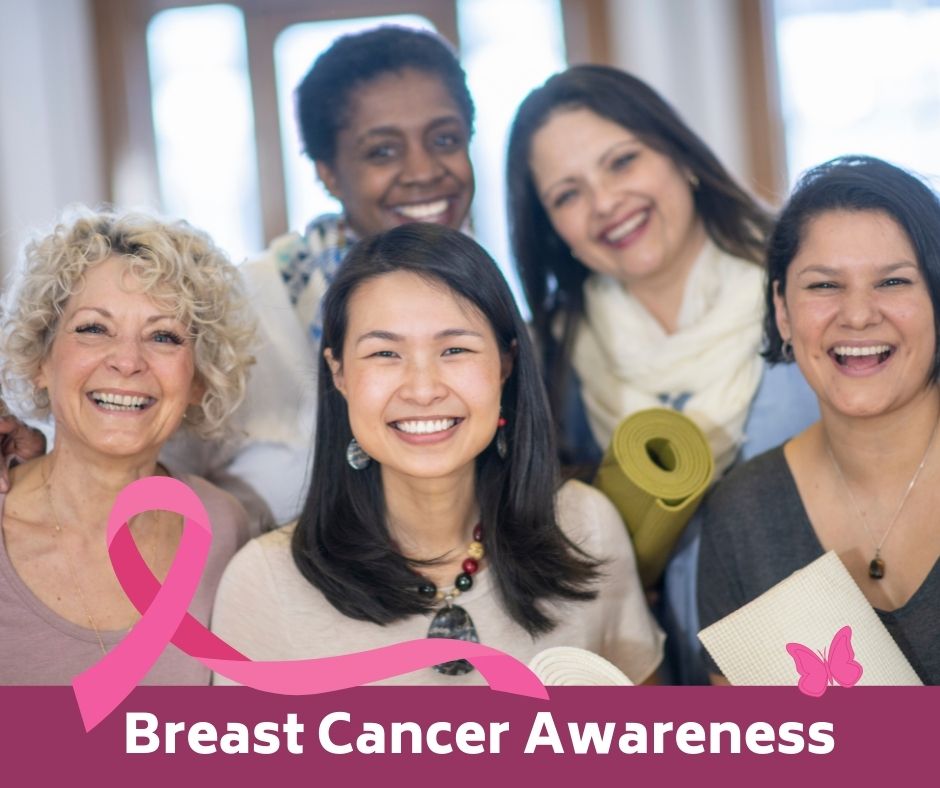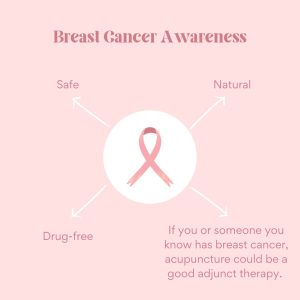
For more than 30 years, October has been recognized as Breast Cancer Awareness Month. This effort to raise awareness and funds for research can be considered a recent endeavor in the history of the disease which has been around for at least 5000 years. Medical texts describe cases dating back to 3,000 BC. Today, about 1 in 8 women will develop invasive breast cancer over the course of her lifetime. (A man’s lifetime risk of breast cancer is about 1 in 883). In order to promote early detection, educational campaigns share information about warning signs such as breast swelling or discomfort, nipple pain or pitted skin. Western medicine researchers have identified hormonal, lifestyle and environmental factors that may increase the risk of breast cancer, but causation is considered extremely complex.
Chinese Medicine organizes causative factors into the following categories which can also interact in complex ways:
 *Stagnation (liver qi): The liver is in charge of moving the qi in the body, dispersing stagnation caused by various influences (such as the other causative factors listed below). Emotional stress can cause a weakness in its capacity for qi distribution and regulation. The liver channel also connects directly with the breasts. Unchecked stagnation can cause dense tissue and masses to form.
*Stagnation (liver qi): The liver is in charge of moving the qi in the body, dispersing stagnation caused by various influences (such as the other causative factors listed below). Emotional stress can cause a weakness in its capacity for qi distribution and regulation. The liver channel also connects directly with the breasts. Unchecked stagnation can cause dense tissue and masses to form.
*Heat: On a very basic level, heat in TCM can be likened to inflammation. This can be caused by internal or external influences. One of the main external influences that can lead to heat (and therefore inflammation) in the body are environmental toxins.
*Deficiencies: Both qi and blood deficiencies can contribute to the development of breast cancer. The immune system needs enough qi to target and remove abnormal (potentially cancerous) cells and regenerate healthy ones. A deficiency of blood can lead to stagnation if there is not enough blood to maintain vigorous circulation (picture a river during a drought). Also, a deficiency of spleen qi (related to digestion) often leads to dampness in Chinese Medicine.
*Dampness: One of the ways dampness expresses itself in the body is by the accumulation of excess fat. Also, dampness and heat combined usually generates ‘phlegm stagnation’ which can take the form of hardness, nodules and tumors.
Luckily, the approach to prevention is not as complex as breaking down the causes.
Prevention tips:
Enjoy nutritious seasonal food to support the creation of new qi and blood.
Avoiding processed food will help to minimize toxic heat and dampness in the body and cut down on our body’s inflammatory responses.
Regular exercise helps us to maintain circulation and a healthy weight while allowing us to sweat out toxins.
Filtering our air and water can help minimize our exposure to environmental toxins.
Liver detox teas and gentle cleansing protocols, especially during Spring (liver time), can be very beneficial in ridding the body of accumulated toxins and supporting the liver’s role in the free flow of qi.
Managing stress is critical. Target your biggest stressors in life and make changes to either remove them, limit them or create better coping strategies.
Massage and castor oil packs can be used preventatively to help avoid local stagnation, often found in fibrocystic (lumpy) breasts (though these direct approaches are usually avoided in the treatment of actual cancerous tumors).
Acupuncture and Herbs are wonderful tools for prevention and can also help to treat side effects of conventional cancer therapies (nausea, neuropathy, pain etc.).
Simply put, TCM’s approach to Breast cancer prevention is overall health promotion. Call Heidi today at (218) 724-3400 to get in for some health promoting acupuncture sessions, to help prevent cancer and other diseases and feel your best!


